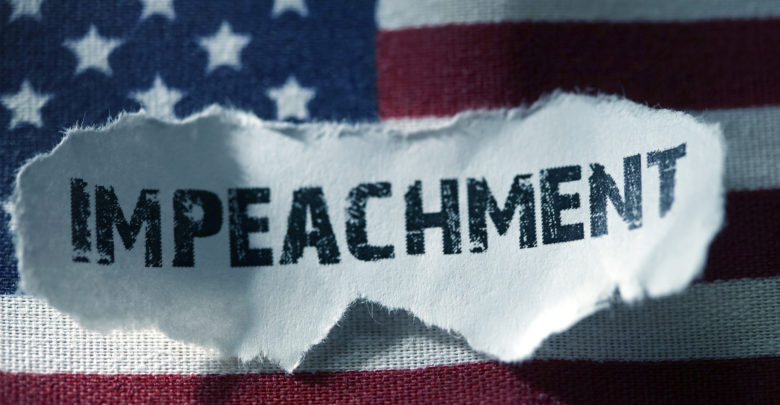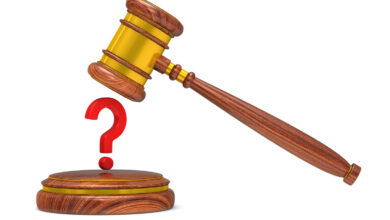Trump’s Defense of Last Resort

Although they haven’t articulated it very well, and perhaps they don’t even fully understand it yet, President Trump’s defenders are beginning to circle around his defense of last resort: insufficient evidence of a corrupt intent.
The proposed articles of impeachment introduced this week charge that Trump abused the powers of the presidency by “corruptly solicit[ing]” the government of Ukraine to interfere with a U.S. election, and then obstructed Congress by ordering “the complete defiance” of a constitutional impeachment inquiry.
The facts—what actually happened—aren’t much in dispute. That leaves why Trump did what he did as the central matter of contention. Team Trump’s last stand will be that the evidence is insufficient to prove that he acted with corrupt intent.
The argument will go something like this:
- We can’t and don’t deny that Trump asked Ukraine to investigate interference with the 2016 election and alleged corruption by Burisma and the Bidens.
- But we deny that there was a quid pro quo conditioning Ukraine aid on those investigations.
- And even if there was a quid pro quo, it was executed by Rudy Giuliani, Gordon Sondland, and others who may have believed they were doing Trump’s bidding, but there’s no direct, first-hand evidence that they actually were.
- And even if Trump himself ordered that military aid be conditioned on Ukraine announcing the investigations, he had a legitimate justification for doing so, unconnected to the 2020 election.
- Therefore, Trump’s actions were not corrupt, and certainly not impeachable.
The underlying premise of this argument—that there is nothing inherently wrong with an American president conditioning foreign aid on the recipient’s agreement to do something that the U.S. government believes furthers its national interests and values—is valid in theory. After all, governments routinely use carrots and sticks to influence the conduct of allies and adversaries alike.
A prime example of a perfectly legitimate quid pro quo is then-Vice President Joe Biden openly and explicitly using foreign aid to leverage Ukraine into firing a corrupt state prosecutor, Victor Shokin. Pressuring Ukraine to get rid of Shokin was the bipartisan policy of not only the U.S. government, but also of the European Union and international financial institutions. Biden was acting on behalf of President Obama when he successfully pushed Ukraine to fire Shokin. There isn’t a shred of evidence that Biden was operating outside the lines of U.S. foreign policy.
But not all quid pro pros are alike. Some are legitimate, even admirable. Some are corrupt, even impeachable.
Trump’s aid-for-investigations scheme falls into the latter category.
Using the Biden example as a defense of Trump is a false equivalency. Yes, both involved conditioning foreign aid on acts demanded of the recipient, but the resemblance ends there. Trump didn’t demand that Ukraine perform acts in furtherance of well-developed bipartisan foreign policy as a condition for the release of aid. It was not official U.S. policy to pressure Ukraine to publicly announce on American television an investigation of Trump’s likely 2020 opponent.
That was all Trump. The career diplomats who were forced to execute this “drug deal” have made that clear.
Still, Trump’s defenders are doing their best to manufacture a counter-narrative. They hope to pin the quid pro quo on something other than Trump’s seeking to boost his 2020 election prospects. The president, they claim, had mixed motives for freezing the aid in the first place, and a legitimate interest in demanding that Ukraine investigate the Bidens.
The proposition that Trump had mixed motives, some of them not inherently corrupt, when he initially froze the Ukraine military aid is credible. But it’s not a defense.
As I wrote last month, it is at least plausible, and consistent with Trump’s character, that Trump’s initial decision to withhold the aid was based on an ugly brew of ignorance, spite, and anger. Trump seems to have genuinely hated Ukraine for a whole host of reasons, including the paranoid fantasy that they “tried to get” him in 2016.
But putting forward irrelevant—and, more importantly, intentionally unprovable—speculation about what was in Trump’s mind when he first decided to withhold aid is an obvious attempt to muddy the waters. The point isn’t why he withheld aid initially, but whether he later conditioned the release of the withheld aid on an announcement of an investigation of his political rival.
And on that, the evidence is overwhelming.
The second piece of Trump’s “no corrupt intent” argument is that even if he conditioned release of the aid on an announcement of an investigation of the Bidens, he did so out of legitimate anti-corruption concerns, not for assistance in the 2020 election. Therefore, the argument goes, this particular quid pro quo was the acceptable kind, neither corrupt nor impeachable.
This is why dirtying up the Bidens is a centerpiece of Trump’s defense. This is why Trump’s defenders are complaining that the Bidens weren’t called as witnesses by the House Intelligence Committee. If congressional Republicans can make the Bidens look bad enough, people might believe that Trump’s intent in asking Ukraine to investigate them was justified, not a corrupt abuse of power.
But this argument is bogus in all sorts of ways. Are we really supposed to believe that Trump, who famously tolerates and even admires some of the most corrupt leaders in the world, suddenly got religion on corruption just in time to demand an investigation of the Bidens?
Or that it’s a coincidence that the only two corruption investigations Trump has ever demanded from a foreign country—a debunked conspiracy theory about Ukrainian interference on behalf of Hillary Clinton in the 2016 election and an investigation of the Bidens—happen to correspond exactly to the red meat Trump dishes out at his campaign rallies?
And what about the fact that Trump didn’t even really demand an investigation, only a public announcement that one would be conducted? Isn’t that exactly how Trump got elected in the first place? Wasn’t James Comey’s last-minute announcement of the reopening of a criminal investigation against Hillary Clinton exactly what handed Trump a comeback victory in 2016?
It worked once for Trump, so why would anybody doubt that he tried to use the same winning formula again, this time with Ukraine?




